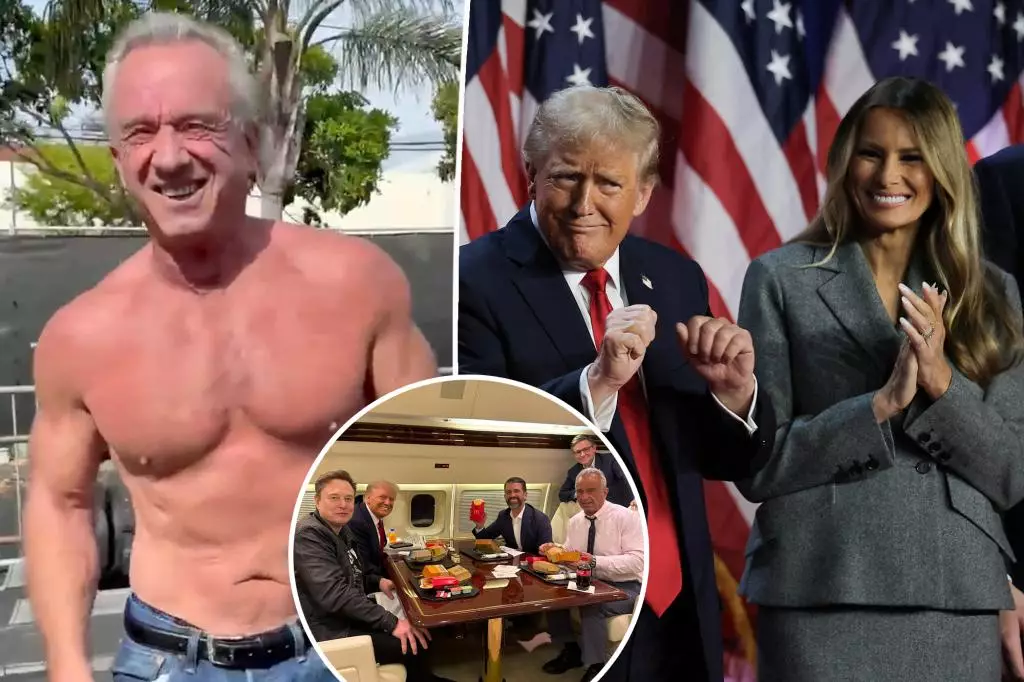In an unexpected twist within the political realm, Robert F. Kennedy Jr. (RFK Jr.) has teamed up with Melania Trump in a bid to reform Donald Trump’s dietary habits. Sources have suggested that this unique partnership is aimed at introducing healthier eating choices for the former president, straying away from the fast-food staples he is notoriously known for. While the duo appears motivated to promote a diet consisting of lean proteins, fresh salads, and vegetables, there are conflicting reports from Trump’s inner circle, which raises questions about the sincerity and efficacy of these initiatives.
Kennedy, a well-known advocate for health and wellness, has been vocal about the dangers of processed foods, famously labeling the fare served on Trump’s personal aircraft, “Trump Force One,” as nothing short of “poison.” This ardent criticism positions him as an unlikely figure in Trump’s dietary decisions, particularly after he was reportedly spotted indulging in a McDonald’s Big Mac and a Coke while aboard the same plane. Such an image raises eyebrows and incites speculation regarding the legitimacy of his health advocacy. Did Kennedy relent under the weight of the fast-food culture he usually critiques, or was this a cynical move to ridicule his former political rivalry?
Despite the push from Melania and RFK Jr., some insiders maintain that Trump remains unyielding in his culinary preferences. A source within Trump’s camp flatly dismissed claims of dietary intervention, reiterating that Trump eats as he pleases, suggesting that the speculation surrounding his diet is mere gossip rather than a reflection of reality. This contrasts sharply with Melania’s reputed determination to foster a healthy environment for her family, often leading gatherings geared toward nutritious dining.
Although there may be an apparent dichotomy between the public’s fascination with Trump’s eating habits and the private efforts by Melania, it is noteworthy that she has been taking steps to influence her husband’s choices. Reports indicate that she has recently taken to cooking healthier meals for family dinners, indicating her dedication to promoting well-being within the household. This unusual domestic initiative raises questions about the impact of personal relationships on public figures’ lifestyle choices.
The media has framed various interactions between Trump, his family, and RFK Jr. as a form of political trolling. The playful nature of their social media presence suggests a deliberate strategy of provoking reactions, particularly from critics who perceive Trump’s habits as emblematic of deeper political issues. One insider described the Big Mac moment as a joke aimed squarely at liberals, who are known to take such controversies seriously, claiming that the team behind Trump enjoys creating frictions that fuel public discourse. In this sense, what may seem like a sincere health campaign could, in fact, be a cleverly constructed ploy for entertainment and political capital.
Health Initiatives: Genuine or Perfunctory?
Kennedy’s appointment to a significant position within the Trump administration, purportedly leading the Department of Health and Human Services, aligns with a broader push for reforming America’s food policies. His focus on eliminating processed foods from school lunches and banning harmful food additives positions him as a potential agent for meaningful change. However, this ambition may be muddied by his contradictory behavior when it comes to fast food indulgences alongside Trump.
Moreover, observations of Melania’s lifestyle—punctuated by her emphasis on personal appearance and health care—offer insight into her possible influence on Trump, guiding both him and their son, Barron, toward healthier habits. As one reflects on the strain between public persona and private lifestyle choices, one wonders whether Melania’s attempts to promote health will yield lasting differences in Trump’s approach to food.
The ongoing saga surrounding Trump’s eating habits, interwoven with Melania Trump’s culinary initiatives and RFK Jr.’s health advocacy, encapsulates a complex interplay between personal ambition, public perception, political intrigue, and entertainment. Each character plays their role in this evolving narrative, where diet reforms appear intertwined with the whims of political trolling. Whether these efforts will translate into substantial change remains to be seen, but they undoubtedly reflect a fascinating dynamic at play in the world of American politics.

